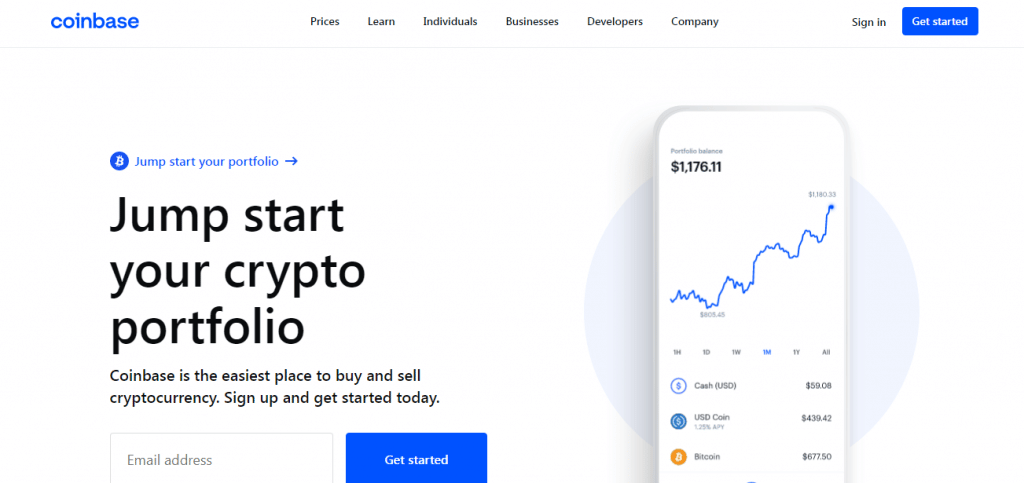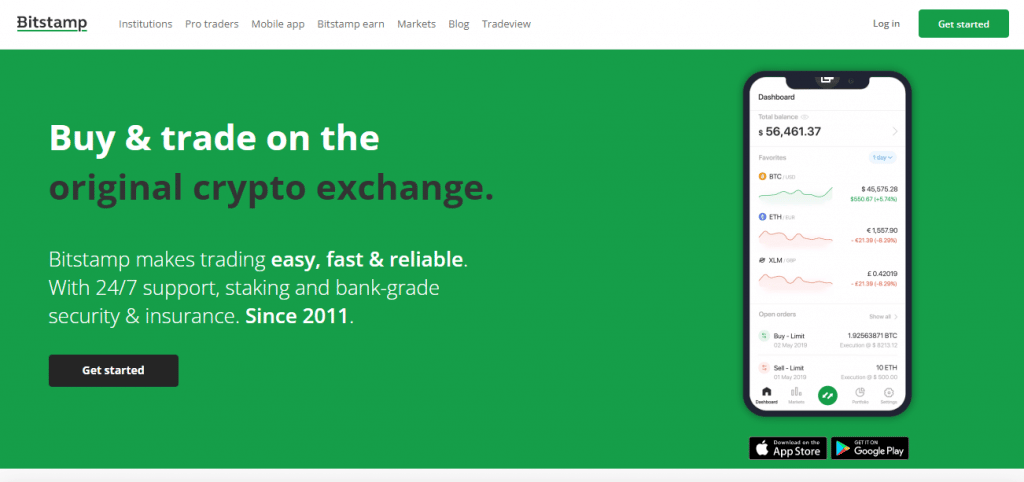Coinbase and Bitstamp are two of the well-known crypto exchanges. Since Bitstamp was launched in 2011, it is referred to as the oldest and longest-running crypto exchange. Coinbase came a year after Bitstamp and has surfaced as a favorite option for U.S. traders.
Both these exchanges offer simple and intuitive web platforms and mobile apps. Besides, traders can trade dozens of unique cryptocurrencies. Coinbase and Bitstamp also follow higher security standards.
For an in-depth comparison of both these crypto exchanges, please continue reading.
Coinbase Trading Platform

With Coinbase, you can store your cryptocurrency in a custodial wallet tied to your Coinbase account. The private keys are held by a digital asset service or the exchange itself. You can also transfer your cryptocurrency to external wallet addresses.
Coinbase comes with a simple and beginner-friendly platform. You can easily buy or sell cryptos, even using Coinbase for the first time. Also, you can earn free crypto via Coinbase Earn. This reward program allows you to make free cryptocurrency.
Coinbase has evolved as a significant player in the cryptocurrency ecosystem. You can use its additional tools, such as the wallet app. This allows managing your cryptos without using the leading Coinbase platform.
When it comes to security, Coinbase takes every necessary step to protect your cryptos. For instance, it offers a “Vault Protection” feature, which ensures added security. Apart from this, this exchange relies on two-factor authentication (2FA). 98% of the assets are stored in cold storage for additional security.
Notable Features
- Superb customer service
- Demo account
- Smart Portfolios
Key Features
- Multi-asset Platform
- U.S. Regulated
- Secure crypto wallet
Pros
- User-friendly platform
- Ability to earn free cryptocurrency
- Supports over 60 cryptocurrencies
Cons
- Relatively higher trading fee
- Can’t control private keys
Bitstamp Trading Platform

Bitstamp is an active trading platform where expert traders can trade comfortably. You can easily manage your account, monitor the markets, and start trading when logged in. For professional trading features, Bitstamp also offers advanced “Business Accounts.”
This suggests that Bitstamp features are tailored for expert and active traders. So, expert and professional traders can trade with additional and performance-oriented features. Bitstamp ensures non-stop availability and professional access to its users.
Both individuals and institutions can participate in crypto trading with constant uptime and reliable order execution. Also, Bitstamp offers a wide array of powerful APIs. You can deploy a tailored strategy or set up a preferred trading interface with such tools.
Notable Features
- Advanced trading platform
- Regulated in the E.U. and USA
Key Features
- Longest-standing Bitcoin exchanges
- Personal and business accounts
- Impressive trading APIs
Pros
- Competitive Pricing
- Apps compatible with iOS and Android devices
- Responsive customer care
- Flexible payment options
Cons
- Not for beginners
- A limited number of cryptocurrencies
Coinbase vs. Bitstamp
This section provides you with an overview of the Coinbase vs. Bitstamp comparison. In addition, we have selected some features of both these crypto exchanges.
1. Coinbase vs. Bitstamp: Fees
When it comes to fees, Coinbase costs higher. Trading fees vary depending on the payment method. For bank transfers, the trading fee is 1.49%—however, the fee increases to 3.99% when paying via a credit or debit credit. Trading fees also depend on the amount of trading you expect to perform every month.
Bitstamp, on the other hand, also permits purchasing cryptocurrencies through a credit or debit card. However, the tiered fee schedule relies on the total trading volume within the last 30 days. For trading volumes up to $10,000, Bitstamp charges as low as a 0.50% transaction fee.
2. Coinbase vs. Bitstamp: User Experience
With a user-friendly dashboard, Coinbase offers a much better user experience. If you don’t want to use hard-to-understand and confusing crypto trading platforms, Coinbase can serve as a viable option. In addition, Coinbase beats others with its simple interface.
Since Bitstamp offers advanced trading options, it is a suitable option for experienced traders. Both these exchanges offer a similar account setup and verification process. Coinbase provides a wide array of instructional guides for beginners.
Bitstamp only answers some basic FAQs. However, the customer service of Bitstamp is more vigilant when compared to Coinbase. It offers premium 24/7 support via phone or email. In addition, partners can also seek the assistance of dedicated account managers.
3. Coinbase vs. Bitstamp: Mobile Apps
Apart from web-based platforms, both Bitstamp and Coinbase are accessible through mobile apps. These apps are compatible with both Android and iOS devices. You can use all the necessary features through the apps offered by Coinbase and Bitstamp. Just like its web-based platform, the Coinbase app is relatively easy to use.
With the Bitstamp app, you can enjoy complete trading functionality such as analytical tools, four order types, and real-time charts. You can even view your cryptos and trade them via Bitstamp app.
4. Coinbase vs. Bitstamp: Technical Charting
Technical charting offers a clear insight into the market situation. This feature is available in both Bitstamp and Coinbase. However, the chart offered by Coinbase is somewhat basic. On the contrary, Bitstamp offers a detailed technical chart with advanced trading view.
Final Verdict
Coinbase and Bitstamp appear to have a lot of similarities in terms of their features and trading options. This makes it hard to choose a suitable platform. To start with, you should choose a crypto trading platform that feels more comfortable to use. The interface should be simple and easy to use. Next, take into account the supported currencies. Coinbase offers a wide selection of cryptocurrencies (over 60). Bitstamp lags behind in this area, as it only supports 28 cryptocurrencies.
The fee schedule of Coinbase is relatively difficult to understand. This is why most of the users end up paying high fees for trading cryptos via this platform. On the other hand, Bitstamp charges low fees, which makes it a perfect choice if you want to lower your trading costs and increase profit margins. When making a choice, make sure to take into account these key factors. It would help you make a wise decision.
Risk Disclosure: Any investments into alternative assets, including cryptocurrencies, come with an inherent risk, where you could end up making less money than what you put in. Before investing your hard-earned cash, be sure to speak with licensed professional financial advisor first. Always remember that past performance is not an indication of future returns.
Disclaimer: The website's owners of Cryptowealthbay.com may be compensated for suggesting certain businesses, goods, and services. While we do everything possible to verify that all of our content is accurate, the information we provide may not be impartial or unbiased, and it does not constitute financial advice.

